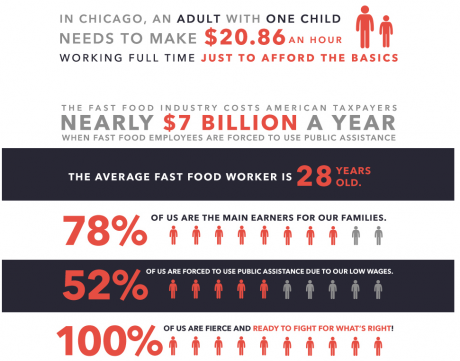Features
You are here
Fast food workers are making history

October 4, 2014
September 4 was the largest fast-food strike in US history. Fast food workers in 150 cities, stopped work and demonstrated, demanding $15/hr and unionization. This was the seventh organized walkout since November 2012. This time, in-home care providers—also trapped by poverty wages—joined in.
Thousands of workers walked off the to demonstrate and engage in civil disobedience. As organizer Jennifer Epps-Addison said, “They are walking off their job and they are going out on strike because they are tired and fed up of the working conditions that they are forced to struggle through.” Police responded with mass arrests—500 across the US—while the fast food companies claimed the workers were paid protesters because they had the support of a strike fund and the backing of the union SEIU.
Whose recovery?
These walkouts reveal a fundamental truth. The post-2008 “recovery” has not led to any income or wealth increase for anyone but the wealthy. About 12 per cent or 50 million Americans, including most fast food workers, are classed as living in poverty according to the government’s own criteria—with African-Americans and Hispanics being over-represented.
As fast food workers chant, “We can’t survive on $7.25” Incomes have been falling for over 30 years in real terms—almost all the increase in wealth and income in these decades has gone to a tiny elite. The minimum wage could be quadrupled to $30 an hour and the poor would still have not have recovered the loss in the real value of their wages.
The corporate media typically reacted to the fast food demonstrators by focusing on disruption and the suffering of customers trying to buy junk food. One Fox News commentator suggested that instead of seeking $15 per hour, fast food workers should get second jobs. But many already have a second or third jobs and still live in poverty. The fast food industry knows its wages are not enough for people to live: Walmart even encourages and advises its low paid workers how to apply for state benefits to allow them to merely live. It is government that supplements minimum wages and makes available a healthy enough workforce. This particular type of corporate welfare can be brought to an end by placing a truer wage cost on corporations. It is in the public interest to impose a $15 minimum wage.
McLies
The largest fast food employer, McDonalds, when faced with a $15 per hour demand claimed they “support paying our valued employees fair wages aligned with a competitive marketplace.” This has been the capitalist claim for the last 200 years. The truth is that the major fast food corporations act like a cartel when it comes to paying poverty wages since all pay roughly the same. Their argument against higher wages rests on the wild assertion that corporations like McDonalds, YUM Brands and Burger King, with revenues in the tens of billions of dollars, remain competitive due to the low pages paid. But if the entire industry is forced to pay a minimum $15 hourly wage, they will all be affected proportionately.
Small businesses operating on very narrow margins will undoubtedly be affected by a $15 hourly minimum wage. There is again a simple solution: reverse the Bush tax cuts for the wealthy and give small businesses employing minimum wage workers an appropriate tax credit. The wealthy do not need the tax cuts, the small business economy does.
Momentum
Perhaps the U.S. is witnessing the beginnings of a larger “Poor People’s Campaign” akin to that led by Martin Luther King in 1968. The lowest paid workers are awakening to their common reality and common interests, and are gaining union support.
The “fight for 15” began in November 2012 when 200 workers walking off the job in New York. In May 2013 there was a walk out across the country, and in August the first national strike of fast food workers in 60 cities. In December there were strikes and community rallies in more than 100 cities, and in May of this year a global day of action in 230 cities on six continents. Last July was the first ever national fast food worker convention that vowed to do “whatever it takes” to win $15/hr and unionization, and last month the largest fast food strike in US history.
Since the fight began minimum wages have increased in 13 states, and 10 city and county governments.Workers have won the $15 minimum wage in Seattle (combined with a city council campaign), San Francisco will vote on $15/hr next month, and the cities of Los Angeles, Chicago and New York are considering $13/hr. The Justice for Janitors campaign in 1990 unionized 225,000 workers, and the ongoing strikes and support from SEIU could similarly arm workers with unions to defend their new wages. According to Cherri Delesline, a McDonald’s worker and mother of four from Charleston, “Everyone should be a part of a union. When I wasn’t, my voice wasn’t being heard.”
Section:









